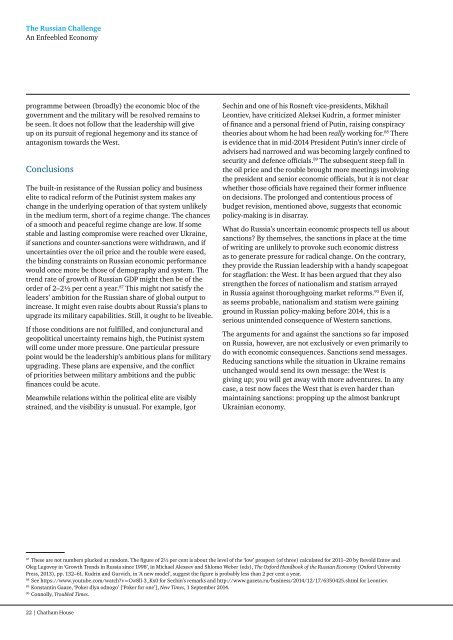The Russian Challenge
20150605RussianChallengeGilesHansonLyneNixeySherrWoodUpdate
20150605RussianChallengeGilesHansonLyneNixeySherrWoodUpdate
- No tags were found...
Create successful ePaper yourself
Turn your PDF publications into a flip-book with our unique Google optimized e-Paper software.
<strong>The</strong> <strong>Russian</strong> <strong>Challenge</strong><br />
An Enfeebled Economy<br />
programme between (broadly) the economic bloc of the<br />
government and the military will be resolved remains to<br />
be seen. It does not follow that the leadership will give<br />
up on its pursuit of regional hegemony and its stance of<br />
antagonism towards the West.<br />
Conclusions<br />
<strong>The</strong> built-in resistance of the <strong>Russian</strong> policy and business<br />
elite to radical reform of the Putinist system makes any<br />
change in the underlying operation of that system unlikely<br />
in the medium term, short of a regime change. <strong>The</strong> chances<br />
of a smooth and peaceful regime change are low. If some<br />
stable and lasting compromise were reached over Ukraine,<br />
if sanctions and counter-sanctions were withdrawn, and if<br />
uncertainties over the oil price and the rouble were eased,<br />
the binding constraints on <strong>Russian</strong> economic performance<br />
would once more be those of demography and system. <strong>The</strong><br />
trend rate of growth of <strong>Russian</strong> GDP might then be of the<br />
order of 2–2½ per cent a year. 87 This might not satisfy the<br />
leaders’ ambition for the <strong>Russian</strong> share of global output to<br />
increase. It might even raise doubts about Russia’s plans to<br />
upgrade its military capabilities. Still, it ought to be liveable.<br />
If those conditions are not fulfilled, and conjunctural and<br />
geopolitical uncertainty remains high, the Putinist system<br />
will come under more pressure. One particular pressure<br />
point would be the leadership’s ambitious plans for military<br />
upgrading. <strong>The</strong>se plans are expensive, and the conflict<br />
of priorities between military ambitions and the public<br />
finances could be acute.<br />
Meanwhile relations within the political elite are visibly<br />
strained, and the visibility is unusual. For example, Igor<br />
Sechin and one of his Rosneft vice-presidents, Mikhail<br />
Leontiev, have criticized Aleksei Kudrin, a former minister<br />
of finance and a personal friend of Putin, raising conspiracy<br />
theories about whom he had been really working for. 88 <strong>The</strong>re<br />
is evidence that in mid-2014 President Putin’s inner circle of<br />
advisers had narrowed and was becoming largely confined to<br />
security and defence officials. 89 <strong>The</strong> subsequent steep fall in<br />
the oil price and the rouble brought more meetings involving<br />
the president and senior economic officials, but it is not clear<br />
whether those officials have regained their former influence<br />
on decisions. <strong>The</strong> prolonged and contentious process of<br />
budget revision, mentioned above, suggests that economic<br />
policy-making is in disarray.<br />
What do Russia’s uncertain economic prospects tell us about<br />
sanctions? By themselves, the sanctions in place at the time<br />
of writing are unlikely to provoke such economic distress<br />
as to generate pressure for radical change. On the contrary,<br />
they provide the <strong>Russian</strong> leadership with a handy scapegoat<br />
for stagflation: the West. It has been argued that they also<br />
strengthen the forces of nationalism and statism arrayed<br />
in Russia against thoroughgoing market reforms. 90 Even if,<br />
as seems probable, nationalism and statism were gaining<br />
ground in <strong>Russian</strong> policy-making before 2014, this is a<br />
serious unintended consequence of Western sanctions.<br />
<strong>The</strong> arguments for and against the sanctions so far imposed<br />
on Russia, however, are not exclusively or even primarily to<br />
do with economic consequences. Sanctions send messages.<br />
Reducing sanctions while the situation in Ukraine remains<br />
unchanged would send its own message: the West is<br />
giving up; you will get away with more adventures. In any<br />
case, a test now faces the West that is even harder than<br />
maintaining sanctions: propping up the almost bankrupt<br />
Ukrainian economy.<br />
87<br />
<strong>The</strong>se are not numbers plucked at random. <strong>The</strong> figure of 2½ per cent is about the level of the ‘low’ prospect (of three) calculated for 2011–20 by Revold Entov and<br />
Oleg Lugovoy in ‘Growth Trends in Russia since 1998’, in Michael Alexeev and Shlomo Weber (eds), <strong>The</strong> Oxford Handbook of the <strong>Russian</strong> Economy (Oxford University<br />
Press, 2013), pp. 132–61. Kudrin and Gurvich, in ‘A new model’, suggest the figure is probably less than 2 per cent a year.<br />
88<br />
See https://www.youtube.com/watch?v=Cw8ll-3_Kx0 for Sechin’s remarks and http://www.gazeta.ru/business/2014/12/17/6350425.shtml for Leontiev.<br />
89<br />
Konstantin Gaaze, ‘Poker dlya odnogo’ [‘Poker for one’], New Times, 1 September 2014.<br />
90<br />
Connolly, Troubled Times.<br />
22 | Chatham House


